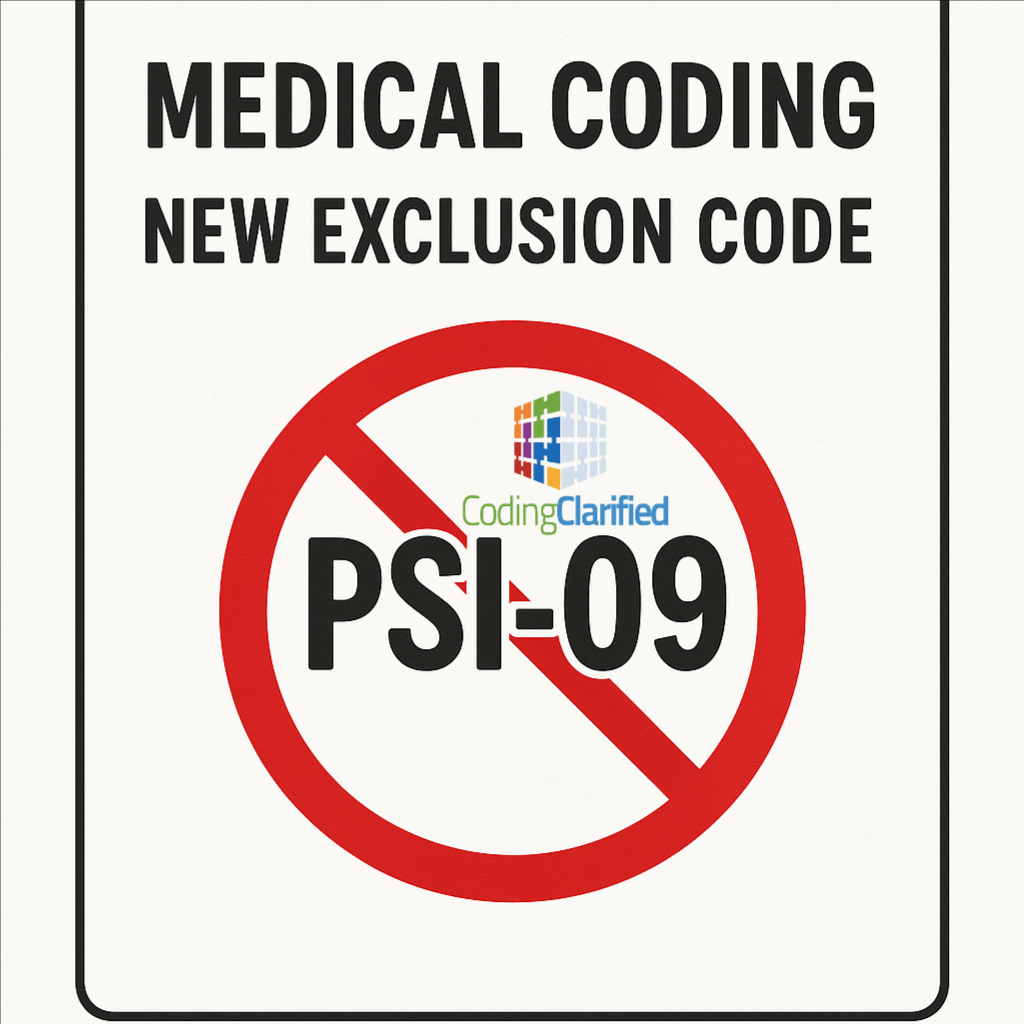Big Update to PSI-09: New Exclusion Codes & What It Means for Coding / Quality Reporting
PSI-09 is one of AHRQ’s (Agency for Healthcare Research and Quality) Patient Safety Indicators: the rate of postoperative hemorrhage or hematoma requiring treatment following surgery. The medical coding new exclusion code PSI-09 is an important quality metric, used by hospitals, quality improvement programs, and payers to track safety outcomes.
What Changed in Version 2025 (as of August 1, 2025)
With the release of AHRQ Quality Indicators Version 2025, there are new denominator exclusion codes for PSI-09. Specifically:
-
Z79.01 – Long-term (current) use of anticoagulants
-
Z79.02 – Long-term (current) use of antithrombotics/antiplatelets
These become exclusion codes — meaning discharges that have these codes (in the appropriate position, present on admission, etc., as per spec) are excluded from the denominator for PSI-09.
Also, for many coders, this change removes a previous requirement to track down D68.32 (Medication-induced coagulopathy) specifically for the exclusion. The new Z79.01/Z79.02 codes simplify (depending on case) the exclusion logic.
These changes were pulled from the AHRQ PSI v2025 technical specifications and change log.
Why the Change Matters
-
Simplification of Workflow / Documentation
Before, if a patient was on long-term anticoagulants or antiplatelets, coders might have needed to see if coagulopathy or medication-related bleeding risk (e.g. D68.32, medication-induced) was documented, or hunt for more specific anticoagulant/antithrombotic documentation. Now, if Z79.01 or Z79.02 is present (with the proper documentation), that is sufficient for many cases to trigger the exclusion. This reduces the burden of looking for “just so” clutter around coagulopathy diagnoses. -
Fewer Missed Exclusions (Potentially)
Some cases where patients are on antithrombotics (but clinicians didn’t document a coagulopathy diagnosis) might not have been properly excluded under previous specs. The new codes help capture those patients more reliably. -
Impact on Rates & Benchmarks
Because the denominator may shrink (i.e. more cases are excluded), the resulting PSI-09 rates could look different. Hospitals will need to assess historical data to understand how much impact this has locally. Benchmarks may shift. When comparing across years, be aware of this code change.
What To Do / Action Items
-
Training: Educate coding staff to recognize and assign Z79.01 and Z79.02 when patients are on long-term anticoagulants or antithrombotic/antiplatelet agents. Make sure “long-term use” is clearly documented and coded (present on admission if applicable).
-
Audit / Retrospective Review: Review prior cases excluded (or not) under older criteria to estimate how many additional exclusions might occur under the new criteria. Compare historical PSI-09 rates excluding those new cases to see how your metric might shift.
-
Documentation: Clinicians need to clearly document long-term use of these medications, even if there is no overt coagulopathy or bleeding event, so coders can assign Z79.01 / Z79.02.
-
Quality Reporting Alignment: Hospitals, QI departments, and payers should update their internal and external reporting tools (dashboards, analytic software) to use the v2025 PSI specification, so the new exclusions are implemented correctly.
PSI-09 exclusion criteria
- Present-on-admission conditions: Cases where the diagnosis of hemorrhage or hematoma is documented as present upon the patient’s admission to the hospital.
- Coagulation disorders: Cases with a diagnosis of a coagulation or hemorrhagic disorder (e.g., specific codes in the ICD-10 range D68).
- Unrelated procedures: Cases where the only operating room procedure was performed to treat the hemorrhage or hematoma, not to treat the underlying condition.
- Obstetric cases: Cases that fall under Major Diagnostic Category (MDC) 14 for pregnancy, childbirth, and the puerperium.
- Missing or invalid data: Discharges with missing or invalid information for age, gender, or principal diagnosis.
- Medication-related coagulopathy: Discharges that specify a medication-related coagulopathy as present on admission.
Things to Keep in Mind
-
Present on Admission (POA) / Timing: As with other exclusions in PSI-09, the timing of diagnoses (e.g., present on admission vs occurring after) matters. If the Z79 code is not flagged POA (as required), it might not serve as an exclusion.
-
Only Long-Term Use: These codes refer to long-term (current) use. Occasional, short-term, or unspecified use may not qualify. The documentation must support “long term” / “current.”
-
Other Exclusions Still Apply: The new codes don’t replace all old exclusions (coagulation disorders, medication-related coagulopathy, etc.). The full spec (v2025 tech specs) should be consulted.
Example Before vs After
| Scenario | Old Spec (pre-v2025) | New Spec (v2025) |
|---|---|---|
| Patient undergoes surgery, is on chronic warfarin (documented), and has no coagulopathy diagnosis | Likely not excluded unless you had D68.32 or analogous—risk of being counted in PSI-09 denominator | Excluded if Z79.01 (long-term anticoagulant) is documented and coded |
| Patient on aspirin or clopidogrel long term, documented through the med list, no coagulopathy | Possibly not excluded (if no antiplatelet-specific exclusion) | Excluded via Z79.02 (long-term antithrombotic/antiplatelet use) |

